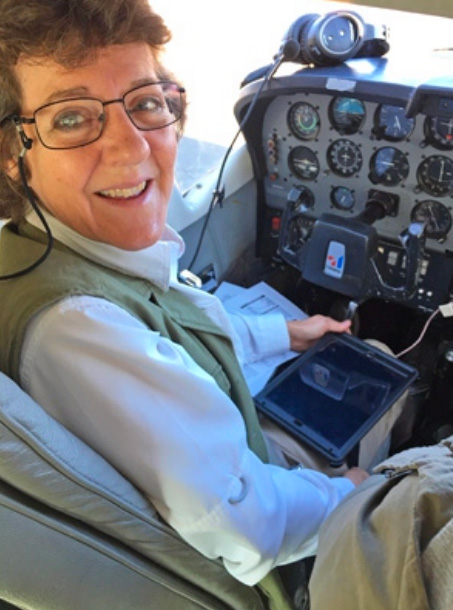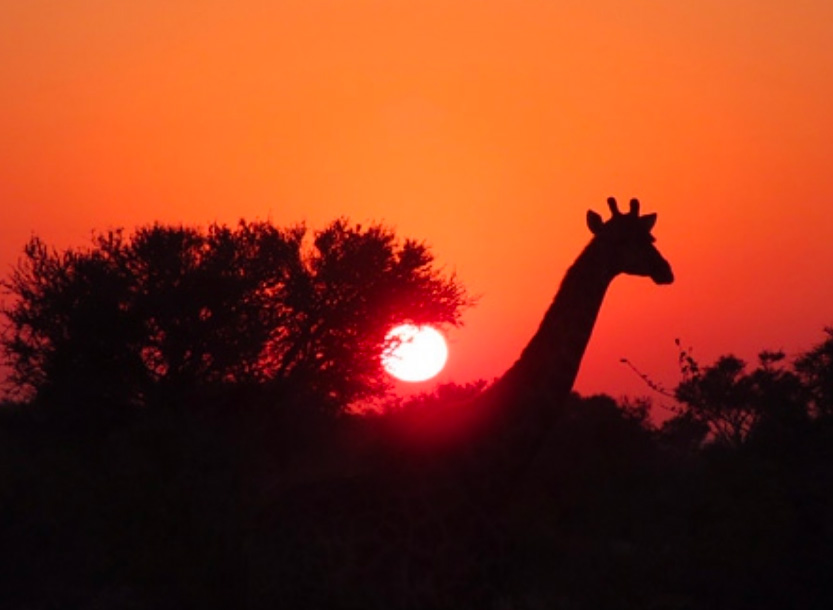Teresa Camp – An Adventure of a Lifetime in a Cessna 182

Teresa Camp
For our June meeting, Teresa Camp did an excellent presentation, and took us along on her ‘Adventure of a Lifetime’ to South Africa. A 10-day self-fly African Safari in a Cessna 182. With what became a dream of one Ninety-Nine aviator friend, became an adventure for other friends to follow along. An opportunity to see a part of the world in a spectacular way. Five Cessna 182’s and a Cessna 210, crossing 3 countries, all interwoven with incredible experiences along the way.
She said she was hesitant to go on the trip because of cost, a total of over $14,000, but knew that this was her once in a lifetime opportunity for such a trip. With over 16-months of preparation, she had to get not only a passport, but also detailed the steps it took to apply to get a pilots license in South Africa.
She had to train in their airspace for the checkride, ultimately getting her African pilots license. Flying a 1982 Cessna 182 with a basic six-pack, a Garmin 430, and no autopilot, so it consisted of hand-flying the entire trip. The African’s used different terminology than what we are used to in the states. And their charts are over ten years old, and that is considered ‘relevant’. They rarely update their charts, and the charts depict villages as well as areas for vultures that should be avoided.
The flight planning consists of manifests. You must explain in depth everything about the flight, and all aircraft is taxed by the number of passengers. She said it was interesting to learn how much freedom we have in the US, as far as flying. They don’t have ForeFlight, they have something called ‘Easy Cockpit’. As well, the poverty in many areas was prevalent, in some ares the copper for the VOR’s had been stolen, so you just learned to adapt and be aware.
In preparation for the flight, packing lightly, avoiding colors that attract insects; and taking along a survival kit, as well as battery packs for electronics. And their winters are our summers, so packing clothes for layers of hot days and cold nights.
 She said her mom instilled in her to take a travel journal on any momentous trip and write in the journal daily. Each night, even late at night, writing down experiences. She said that become insightful looking back, helping remember a lot of details that she would have forgotten otherwise.
She said her mom instilled in her to take a travel journal on any momentous trip and write in the journal daily. Each night, even late at night, writing down experiences. She said that become insightful looking back, helping remember a lot of details that she would have forgotten otherwise.
Traveling through cultural villages in Zimbabwe and Botswana. Experiences such as eating ‘mopain worms’ with villagers, that were ‘crunchy like a Cheeto’, but definitely didn’t taste good, and tours such as the Apartheid Museum. Outstanding accommodations that resembled more so ‘glamping’, not camping; extraordinary luxury with unexpected elegance; wines, catering and laundry service, as well as indoor plumbing, yet all intermingled with the animals right at your doorstep. Sleeping accommodations consisted of exquisite views and amenities, with hot towels at the end of the day after a flight.
Safari’s were set at either sunrise or sunset, taking advantage of incredible landscapes. Most safari’s were in Range Rovers, but some were actually in boats. Some of the guides carried weapons, since the vehicles were open and there would be exposure to the animals; and the guides would advise everyone to ‘not act like a predator or prey’. Guides would look for footprints and tracks, and all along the way they would give you insight to what animals were within the areas, and insight to their activities in their natural environment.
From hearing roaring lions, to seeing a rare white rhino, the safari was everything that could be imagined and more. A journey through Africa that brought amazement to see so many different animals. From monkeys, lions, cheetahs and elephants, to hippos, giraffes, eagles, jackals and hyenas. To the less known wildebeest, and “Jesus’ birds that walk on the water.
In concluding, Teresa’s reflections on the trip were that she learned that it takes skill to locate and track wild animals. The African guides were not only valuable to help them find animals in their habitat, and view up close, but they also knew considerations for safety. She said, ‘your safety is an illusion’, reliant on your own behavior. You must be mindful that how you act can affect your own safety.
She also learned a lot about the people of Africa, that they speak English, and the ease in communication was rewarding. That they face difficult challenges with not only unemployment, but also poverty and immigration. And African’s love tourists, because they bring not only money, but jobs.
As far as aviation, she learned that a Cessna 182 is a great safari aircraft, and she learned about herself as a pilot. Through the journey she was able to build upon her skills, stretching her boundaries as an aviator, with the reassurance that ‘I’m not a bad pilot’.
Teresa said that ultimately what she learned from the trip was that it was a great privilege to pilot her own aircraft across multiple countries, and that she greatly cherishes the freedoms and counts her blessings even more. In every sense, it was an ‘incredible trip of a lifetime’.

